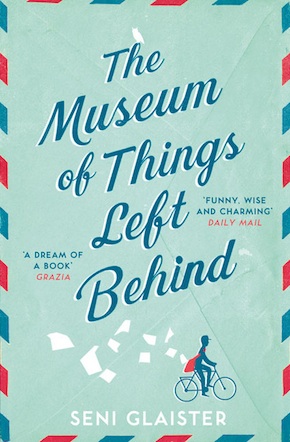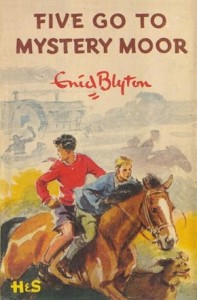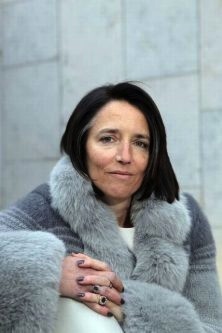Imaginary friends
by Seni Glaister
“A witty, feel-good read.” Good Housekeeping
I’ve always surrounded myself with books. As a child they weren’t just my respite and my escape, they were larger than my reality and they fuelled my passion for, and the expectation of, the unlikely. Nor were their authors my heroes in the current understanding of the role. I didn’t expect to meet them in person or queue to have a book signed, and I couldn’t tweet them and expect a reply or some other affirmation of my existence in their lives. It was the stories I craved, not the vehicle that delivered them. To me, the authors were indistinguishably intertwined with their fiction – unreachable, untouchable, mythical and magical. I doubt, in fact, I ever credited them with flesh and blood – I read books by dead authors and live authors but I made no distinction between the two, they were merely the conduit through which a story that needed to be told reached me.
My parents were hard workers, my father a doctor and my mother a nurse. Together they chose a lifestyle that demanded much of them physically. They lived in a house that was constantly expanding around them to suit their growing family. Each improvement and enhancement was the result of their effort. My father came home from work and built brick walls, mixed cement, laid pipes, connected complicated electric circuits. I can see him now with sweat running down his face as he manoeuvred large panes of glass, as wide as his outstretched arms, to lock tightly into place in a new window. Meanwhile my mother raced home from work to tend the garden, dig heavy soil, plant seeds and harvest crops. Together they extracted from the earth a better lifestyle than their combined salaries could have otherwise afforded. She baked bread before she left for work, milked the goat to make butter, cheese and ice cream, raised the lambs and the goats, the hens and the ducks to fill our freezers with luxuries and delicacies that demonstrated to their children that they had chosen to value good food above leisure.
I craved the bread I’d spied in my friends’ houses – white, pre-sliced, and popped into a toaster, not pronged by a toasting fork. I longed for milk and yoghurt that didn’t taste the way the goat smelt.”
A sought-for idyll now of course, but this was the 1970s not the 1940s. While other people were filling their gardens with Swingball and pampas grass and their homes with cheesecloth, waterbeds and labour-saving devices that would deliver more free time for Cinzano-drenched weekends, my parents were winding the clocks back thirty years and hauling their four oblivious daughters with them. Friends praised our bountiful table, our Sunday roasts, our plentiful homemade beer. I craved the bread I’d spied in my friends’ houses – white, pre-sliced, and popped into a toaster, not pronged by a toasting fork. I longed for milk and yoghurt that didn’t taste the way the goat smelt.
There was always so much to do. In the summer months the television was unplugged and heaved into the loft. Depending on the season there were piles of grass to rake, bonfires to build, peas to pod and broad beans to prise out of their uniquely velvety cases. There were redcurrants to strip from their spindly stalks, and sickly lambs given to us by kind local farmers to bottle-feed back to robustness. I was eleven before I discovered other people had access to television in the summer holidays but, rather than allowing myself to feel a fool, I disavowed myself of it altogether, wearing my reading as a mysterious and inaccessible badge that set me apart from my contemporaries.
My parents had no cash for babysitters but they didn’t stint on books – though I suppose many came from the library. Books were our babysitters. My parents would go to a dinner party and leave the four of us parked in the car with sleeping bags and something for each of us to read. I was a fluent reader before I was a fluent speaker. I re-read Allison Uttley and Beatrix Potter voraciously. I remember the thrill of anticipation, the sheer terror of the predator’s cunning, the certainty of the upset, known yet appalling all over again. I was scarred by the age of four, left with a bone-deep distrust of the weasel and the fox.
Our holidays, too, were spent in a house that made relentless, unforgiving demands upon my parents. Certain they would be unable to afford foreign holidays with their large family, they had bought for a few hundred pounds a crumbling farm cottage in mid-Wales, almost inaccessible in the winter and with no access to running water or electricity. The Welsh winds tore through the gaps around the windows and the rain delivered fat droplets that clustered and streamed against the small glass panes and blocked the view of the sheep-strewn hills that surrounded us. But again, in a weekend pattern that varied little from his midweek one, my father built the house around us, plugging the gaps and gradually adding amenities that my friends were absolutely right to take for granted. For most of our childhood, each evening the four of us carried bars of soap down to the stream and plunged ourselves into the crystal-clear water that magnified the razor-sharp edges of the slate bed. To rinse shampoo and soap off our goose-bumped bodies required us to immerse our heads beneath a fierce flow of cold running water, delivered from a wide-mouthed iron pipe that ran from a spring in the hill above. The shock of the pain was a searing, neuralgic headache that lasted only as long as our scalps bore the brunt of the water and was gone as quickly as we shook ourselves dry, shrieking with laughter. We always laughed.
Hot baths were available in the winter, in shared splashes of scalding water and soap from buckets in front of the fire. But even this luxury was the result of family effort. The water had to be fetched from the spring in a big pale plastic urn that smelt of the hills, and to heat the water the wood had first to be gathered and chopped.
But I wasn’t a model child. If I could duck a duty I would. I would hide in a tiny gap made between the end of a sofa and the start of the bunk bed I shared with my sister and I would read. I could hear my family calling for me as they set off to forage for mushrooms or to walk to the neighbouring farm for eggs but, head in my book, I would block out their calls and turn the pages, breath held as much in anticipation of the next plot development as in fear of being caught.

The thirteenth book in the ‘Famous Five’ series. Hodder & Stoughton, 1954. Wikimedia Commons
But once the evenings were dark and we’d fed ourselves on fat steaks cooked over the fire, potatoes roasted in the ashes, warm sweet onions caramelised in packets for hours while we bathed, then our reading by candlelight was untempered and, importantly, uncensored. The shelves in our Welsh house were crammed with books. My reading journey zigzagged wildly with no adult intervention from Alison Uttley to Enid Blyton. I read every book she wrote, passing quickly from the childish tales of gnomes and fairies to the adventures undertaken by the Famous Five, the Secret Seven and the others who arranged their childhoods so perfectly that adults never interfered, never imposed a curfew or a duty. These adventures were life-affirming takes of good versus evil, but also of the indomitability of teamwork. No one child had the force to outwit a villainous adult, but together their strengths and skills combined to triumph over evil again and again. Their brilliance was the power of a collective. The freedom these children had been afforded by their errant parents enabled them to create their own adventures, and the risks were always outweighed by the pleasure of a long summer unfettered by the disabling limitations of adulthood. (I would need to re-read the full canon to understand why I remain so certain that Uncle Quentin was up to no good and that there was something Enid Blyton was neglecting to tell us, but it was fiction that taught me to know that sometimes you must be especially wary of the grown-ups that are supposed to protect you.)
There was a chronological gap then in my reading, not yet filled by the modern-day masters. I didn’t discover the coming-of-age essentials until much later simply because they were not the books that filled my parents’ shelves. Their own holiday reads tended towards Leslie Charteris, Len Deighton, Harold Robbins and John Le Carré. The over-coloured Pan paperbacks were my bedfellows, which seamlessly replaced the adventures of Julian, Dick, George, Anne and Timmy the dog. I read them all, every diamond-smuggling, elephant-hunting, double-crossing one of them. The women were strong not simpering, but they were often temptresses, rarely the heroines. The books didn’t shape me politically, thankfully, they just opened the window onto a world which behind the driving rain was filled with possibility and the certainty of denouement – which is something we should all seek in our lives, ideally daily.
Whilst my friends were spending their holidays acquiring important life skills, like playing tennis and riding horses and kissing boys at the NSPCC disco, I was leading a far more glamorous and enriching life. True, I was unable to join in their conversations, I wasn’t absolutely sure why this boy or that pony was such a catch, but my god I could weave a table mat from reeds and I could tell them a few things about life.
Today there is a much broader spectrum of fiction to introduce the endless possibilities and probabilities that exist and I envy the modern teenager who can much more readily turn to a book to find somebody just like themselves.”
Once a reader always a reader, so my adolescence, crammed with books intended for a much older person, gave way quite naturally to the books that I needed to plug some of the important growing-up gaps – the fiction that told of the more troubling realities, the ones that could creep up and get you regardless of your appetite for adventure. The Bell Jar and The Catcher in the Rye, Little Women and I Capture the Castle. Books that taught you to interpret and understand humanity, to know that all people were not equal, that some had more demons to deal with than others, but that we were all susceptible to encountering some of this internal malevolence at various points in our lives. Today there is a much broader spectrum of fiction to introduce the endless possibilities and probabilities that exist and I envy the modern teenager who can much more readily turn to a book to find somebody just like themselves.
My erratic reading journey took me rapidly towards a period of solid immersion in the great works of feminism, sparked by a chance encounter with Radclyffe Hall’s The Well of Loneliness. These books planted the ideas that would be the base, the underscoring, of the rest of my life, the knowledge that there were these great and marvellous things to be fought for and won, and that these battles hadn’t already happened without me. These books made me feel relevant and purposeful at a time when it would have been so easy to become lost forever.
And then, with a crashing moment of serendipity, the type of coincidence that is allowed to flourish unchallenged in fiction, I came across a new type of book that I had never found on my parents’ shelves and I had never been drawn to with the guidance of a teacher or peer. John Irving, Isabel Allende, Gabriel García Márquez, Toni Morrison, Haruki Murakami. Magic realism and strange, poetic fiction that was imbued with more than just story. The type of fiction that unravelled as much as it wove. Fiction that required the reader to complete it. Without the feminist tracts that gave me purpose I would have been a less fulfilled adult, but without the fiction that has sustained me ever since, I would have been a less bold one. These were the books that completed the circle begun as a four-year-old prepared to terrify herself for the thrill of story. These were the stories that made me know with certainty that fiction could be more relevant than reality, and that it was entirely possible to write yourself into the central role of your own narrative. I learnt through reading to opt, wherever possible, for the less travelled path, to take the scarier route, to follow the less likely outcome. These are the books that told me to keep taking the risks that would inevitably lead to my own colourful stories, a richness of experience that would mean, regardless of all other influences, I could be the author of my own adventure.
 Seni Glaister has worked in bookselling since 1988 and was the co-founder and CEO of The Book People and recently founded ‘affordable supper club’ WeFiFo. She has four children and lives in Sussex. The Museum of Things Left Behind, her first novel, is out now in paperback from Fourth Estate. Read more.
Seni Glaister has worked in bookselling since 1988 and was the co-founder and CEO of The Book People and recently founded ‘affordable supper club’ WeFiFo. She has four children and lives in Sussex. The Museum of Things Left Behind, her first novel, is out now in paperback from Fourth Estate. Read more.
@BookPeopleSeni

